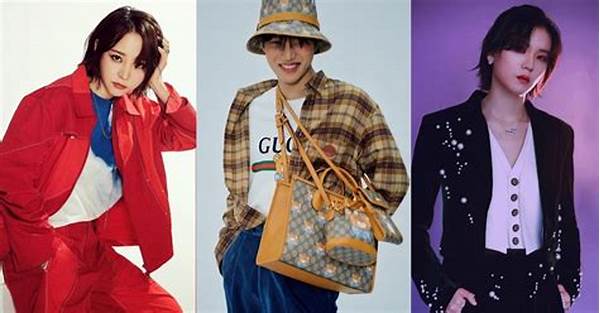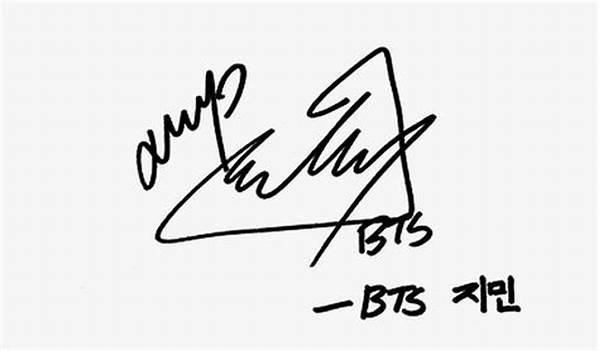Hey there! So, if you’ve been living with your head buried under a rock, you might’ve missed the huge global explosion of K-pop. Trust me, this isn’t just catchy tunes and fancy dance moves—it goes deeper. Everyone’s buzzing about how the influence of K-pop on gender stereotypes is shaking things up, redefining what we once thought about gender norms. Dive in with me as we unwrap this colorful world where your biases might just get a reality check!
Read Now : Styling Tips From Ateez Members
K-Pop: Redefining Gender Norms
It’s no secret that K-pop idols are breaking barriers when it comes to traditional gender norms. You see it everywhere—from flashy fashion choices to how they effortlessly blur lines between masculinity and femininity. The influence of K-pop on gender stereotypes permits fans to reimagine personal identities beyond rigid boundaries set by society. In the K-pop universe, idols freely express themselves without succumbing to traditional gender roles. Boy bands might embrace makeup and expressive fashion, traditionally seen as feminine, while girl groups can exude fierce strength without being boxed into gender expectation. Because of this, fans around the globe are now questioning their views on masculinity and femininity. It’s not just about appearance; it also reflects in lyrical content and the diverse storylines present in their music videos. All of these elements combine, fostering a generation that’s much more open-minded and flexible about gender nuances. So, how has the influence of K-pop on gender stereotypes played a role in your life or perspective? Let’s dive further in this fascinating topic!
Breaking Down the Influence of K-Pop on Gender Stereotypes
1. K-pop idols often challenge traditional gender roles through their unique style, affecting fans’ perceptions globally.
2. Boy bands incorporate makeup, typically seen as female-only in many cultures, enhancing the influence of K-pop on gender stereotypes.
3. Girl groups aren’t afraid to display strength and independence in their performances, challenging normatives around feminine vulnerability.
4. Lyrics in K-pop often question societal gender expectations, encouraging self-expression beyond traditional views.
5. The international fanbase actively discusses and embraces these evolving narratives, showing just how widespread the influence of K-pop on gender stereotypes has become.
K-Pop Fashion: A Catalyst for Change
A walk through the world of K-pop instantly dazzles with its eye-catching style choices. Known for their elaborate costumes and stunning aesthetics, K-pop idols are at the forefront of redefining what’s cool—and not just in Korea. This influence of K-pop on gender stereotypes is most visible through their eclectic fashion statements, where previous taboos around men wearing makeup or women donning aggressive styles are now celebrated and valued. Visually, it challenges the viewer to modify their perceptions about gender expression, transforming the fashion industry norms one step at a time. Plus, it proves that self-expression knows no bounds, allowing fans to push their preconceived barriers. Often praised for its boundary-pushing looks, K-pop is showing everyone that style is a personal narrative, untethered to society’s conventional expectations. Whether it’s platform boots or brightly dyed hair, these iconic artists are shaping a new fashion dialogue. By challenging the norms so openly, they pave the way for discussions on gender fluidity, acceptance, and embracing one’s true self without fear of judgment or ridicule.
Read Now : Ateez Fashion Style Influencers
The Cultural Shift Driven by K-Pop
K-pop’s massive international reach plays a crucial role in amplifying discussions about gender. First off, their unique approach to gender-neutral fashion and performance directly confronts rigid afterthoughts about what is considered masculine or feminine. Furthermore, the inclusive fandoms foster welcoming environments that emphasize respect. Globally acclaimed acts like BTS and BLACKPINK not only adorn themselves with visually arresting styles that costar with their USPs but also address gender themes in their music. It’s no wonder, then, that the influence of K-pop on gender stereotypes continues to make headlines worldwide. When young fans look up to their idols, they don’t just see performers; they see individuals like themselves, grappling with identity issues and embracing diversity despite cultural clampdowns. This visibility plays into a broader narrative of self-acceptance and empowerment. People begin to acknowledge that their outward expression can mirror an internal transformation. K-pop culture doesn’t just entertain; it revolutionizes and educates, urging society to re-evaluate limiting gender stereotypes. It’s a gentle yet persistent nudge toward inclusivity and understanding.
Fan Reactions: A Global Perspective
As the influence of K-pop on gender stereotypes steadily spreads, fans worldwide voice their thoughts online. Most notably, they observe how these idols impact shifting ideologies within their local culture, encouraging dialogue. Through social media, fandoms create a space where self-assurance is celebrated. Forum discussions gravitate towards analyzing idol personas, shedding light on indispensable insights about transcending boundaries. Fans begin to question previously held beliefs and how they perceive gender roles within their own communities. What happens next is a cascade effect—those influenced by K-pop idols begin mirroring those ideologies in their networks. Also fascinating is how fans take this inspiration beyond fashion—delving into posture, vocals, or even engaging with significant social issues, idealized by their favorite idols. As expected, this ripple effect captivates an audience beyond K-pop fandoms. Mainstream media catches the wave of attention generated by multiple voices ushering in these dialogues. Essentially, the cultural phenomenon doesn’t happen in isolation. K-pop’s influence manifests in manifold ways to diminish peculiarity around gender stereotypes. It’s not just about catchy hooks or keeping time to the beat—it’s genuinely redefining how a global society thinks and feels about gender.
K-Pop and Gender Norms: The Road Ahead
Embracing the influence of K-pop on gender stereotypes involves acknowledging fluidity in identity. The music genre continues to beckon dialogues not possible a decade ago. As we ponder the road ahead, it’s undeniable that K-pop has etched indelible marks on reshaping gender-friendly perspectives. The most promising aspect? The younger generation is largely instrumental in this transformation. New alliances and spaces spring forth as fragments of traditionally entrenched notions slowly disintegrate through open conversation. Ebbing tides ferociously dismantle the barricades—a testament to how K-pop remains a catalyst for societal discourse. Fans position themselves at the forefront, pushing for a global society that accepts differences as strengths. In essence, K-pop challenges staunch stereotypes, encouraging a realm of openness enveloped in self-definition and creativity without restriction. Now loosely within a mingle of creative synergy, music transcends borders. Conclusively, celebrating the influence of K-pop on gender stereotypes isn’t just about music’s impact—it’s about acknowledging art’s potential to reshape cultural landscapes profoundly. So, keep an eye out—K-pop’s revolution is far from over!
There you go, a casual and insightful jaunt into the incredible ways K-pop is shaking up gender norms globally. What’s your take on the influence of K-pop on gender stereotypes? Share your thoughts below!


